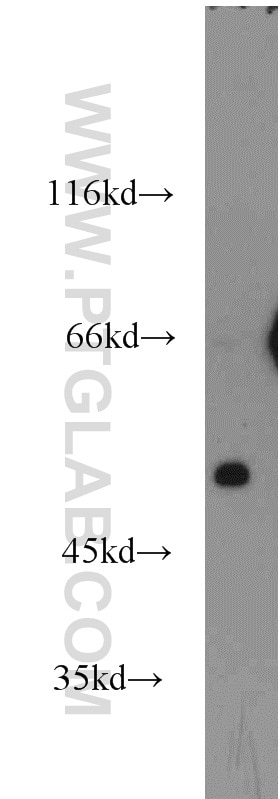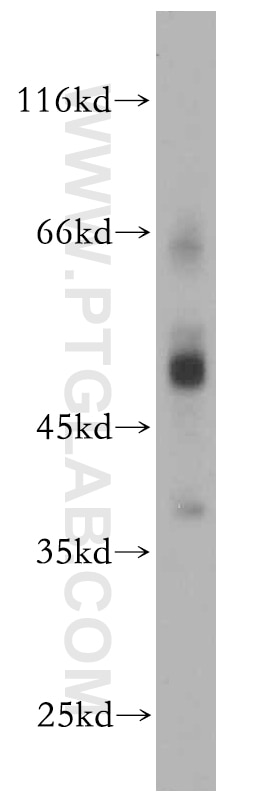SCTR Polyklonaler Antikörper
SCTR Polyklonal Antikörper für WB, ELISA
Wirt / Isotyp
Kaninchen / IgG
Getestete Reaktivität
human, Maus, Ratte
Anwendung
WB, ELISA
Konjugation
Unkonjugiert
Kat-Nr. : 14172-1-AP
Synonyme
Galerie der Validierungsdaten
Geprüfte Anwendungen
| Erfolgreiche Detektion in WB | Maus-Pankreasgewebe |
Empfohlene Verdünnung
| Anwendung | Verdünnung |
|---|---|
| Western Blot (WB) | WB : 1:500-1:3000 |
| It is recommended that this reagent should be titrated in each testing system to obtain optimal results. | |
| Sample-dependent, check data in validation data gallery | |
Veröffentlichte Anwendungen
| WB | See 1 publications below |
Produktinformation
14172-1-AP bindet in WB, ELISA SCTR und zeigt Reaktivität mit human, Maus, Ratten
| Getestete Reaktivität | human, Maus, Ratte |
| In Publikationen genannte Reaktivität | Maus |
| Wirt / Isotyp | Kaninchen / IgG |
| Klonalität | Polyklonal |
| Typ | Antikörper |
| Immunogen | SCTR fusion protein Ag5371 |
| Vollständiger Name | SCTR |
| Berechnetes Molekulargewicht | 440 aa, 50 kDa |
| Beobachtetes Molekulargewicht | 50-55 kDa |
| GenBank-Zugangsnummer | BC035757 |
| Gene symbol | SCTR |
| Gene ID (NCBI) | 6344 |
| Konjugation | Unkonjugiert |
| Form | Liquid |
| Reinigungsmethode | Antigen-Affinitätsreinigung |
| Lagerungspuffer | PBS mit 0.02% Natriumazid und 50% Glycerin pH 7.3. |
| Lagerungsbedingungen | Bei -20°C lagern. Nach dem Versand ein Jahr lang stabil Aliquotieren ist bei -20oC Lagerung nicht notwendig. 20ul Größen enthalten 0,1% BSA. |
Hintergrundinformationen
SCTR is a member of the family B G protein-coupled receptors. SCTR is a receptor for SCT, a gastrointestinal peptide hormone secreted by the S cells of the duodenum. SCT regulates water homeostasis throughout the body, and influences the environment of the duodenum by regulating SCT in the stomach and pancreas. Studies suggest that SCT can act as a neuropeptide within the central nervous system (CNS), thus SCTR may regulate the function of the CNS.
Protokolle
| Produktspezifische Protokolle | |
|---|---|
| WB protocol for SCTR antibody 14172-1-AP | Protokoll herunterladen |
| Standard-Protokolle | |
|---|---|
| Klicken Sie hier, um unsere Standardprotokolle anzuzeigen |
Publikationen
| Species | Application | Title |
|---|---|---|
Neurochem Res Reduced D-Serine Release May Contribute to Impairment of Long-Term Potentiation by Corticosterone in the Perforant Path-Dentate Gyrus. |



